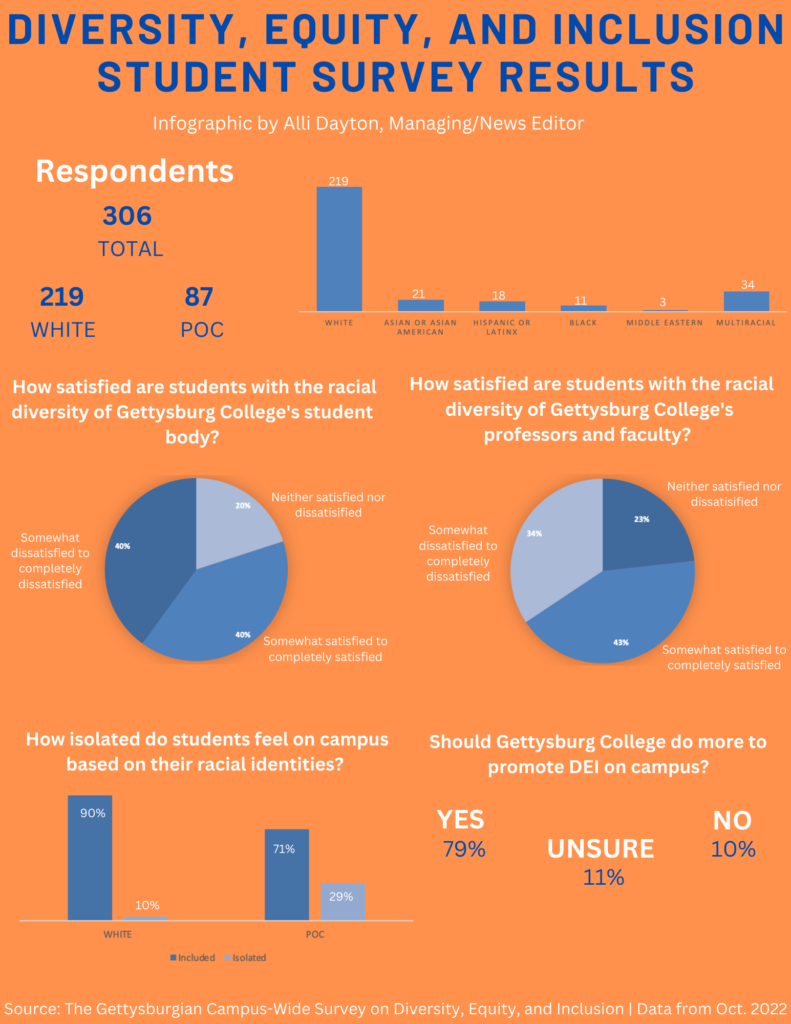Campus Poll Examines Student Perspectives on Diversity, Equity, and Inclusion
By Katie Oglesby, Editor-in-Chief, and Alli Dayton, Managing/News Editor
A recent campus-wide survey by The Gettysburgian evaluated how student perspectives on diversity, equity, and inclusion differed. The survey was sent to several student organizations, including organizations that represent the identities of historically underrepresented communities.
306 students completed the survey, with 219 students identifying as white and 87 identifying as people of color (POC).
Safety
The survey first provided questions about perceptions of safety among Gettysburg College students. Overall, 92 percent of the students surveyed feel either somewhat safe, safe, or completely safe on campus, and 90 percent of students of color feel either somewhat safe, safe, or completely safe on campus.
Contrastingly, 76 percent of both white students and students of color feel either somewhat safe, safe, or completely safe in the Town of Gettysburg. This leaves 24 percent of students feeling somewhat unsafe, unsafe, or completely unsafe in the Town of Gettysburg.
Anecdotal evidence from students suggests that many tend to feel unsafe on campus.
Inclusion Officer of Student Senate Allie Acero ’23 said, “We’ve had issues over the years with select few people in the greater Gettysburg community harassing students of color on public streets, but it is only this year that there is a larger and overbearing sense of unsafety now on our campus.”
Satisfaction with Racial Diversity
Next, the survey examined student satisfaction with the racial diversity of the Gettysburg College community.
Regarding the racial diversity of the student body, 40 percent of students said they were somewhat satisfied, satisfied, or completely satisfied. Another 40 percent of students noted that they were somewhat dissatisfied, dissatisfied, or completely dissatisfied. 20 percent of students said they were neither satisfied nor dissatisfied.
The statistics differed slightly when students identified their feelings about the racial diversity of Gettysburg College’s faculty and staff. 42 percent of students said they were somewhat satisfied, satisfied, or completely satisfied, and 34 percent were somewhat dissatisfied, dissatisfied, or completely dissatisfied with the racial diversity of the faculty and staff. 23 percent felt neither satisfied nor dissatisfied with this diversity.
Anderson Gray ’23, DEI Chair of Alpha Delta Pi, said that while underrepresented groups seem to be gaining more of a voice on campus, she believes the administration has slowed these changes.
“As an [Africana Studies] major who cares about seeing herself represented in faculty and staff on campus, it is disheartening to see so many Black faculty members having left within the last two years because of the lack of support at this college,” Gray said.
Acero expressed a similar sentiment.
“I feel like there has been a decrease in diverse faculty, which can be explained by recent budget cuts, but because of the decreasing diversity, there is less of an opportunity to foster an inclusive community,” Acero said. “Without a diverse faculty, potential students of color might be dissuaded from coming to Gettysburg College because there aren’t outlets of support that understand students’ struggles from a personal level.”
She noted that, “As a queer woman of color, an immigrant, and a first generation student, I feel like there aren’t many outlets for me to speak about my experience and be related to. Last year, I brought up creating a Filipino Student Association to the only Filipinx faculty I know, but since then, the professor has left Gettysburg College.”
Inclusion On Campus
The survey then asked students to consider the extent of their feelings of inclusion and isolation on campus, based on their racial identities.
97 percent of white students said they feel somewhat included, included, or completely included, whereas only 71 percent of students of color said they felt the same way. 3 percent of white students felt somewhat isolated, isolated, or completely isolated based on their racial identities, compared to 29 percent of students of color.
Specifically, concerning campus social activities, 99 percent of white students said they felt somewhat included, included, or completely included, in contrast with 80 percent of students of color. Only 1 percent of white students identified themselves as somewhat excluded, excluded, or completely excluded from campus social activities, whereas 20 percent of students of color felt that way.
DEI Chair of Alpha Chi Rho Henry Namiot ’23 said, “…I feel that the college is mostly ambivalent to the minority groups on campus. At the LASA general meeting, it was brought up that often the students are responsible for creating their own safe spaces and that the school favors some groups over others. There is much that can be improved with the college’s DEI efforts, and I hope that when they do reconsider their approach, they think about how to serve all of the communities on campus and not just a select few.”
Recommendations from Students
Finally, the survey asked students whether they would recommend Gettysburg College to an incoming student with the same racial identity as them. 88 percent of white students said that they would recommend the College, and 63 percent of students of color said they would recommend the College to someone with their racial identity.
On the topic of Gettysburg College’s current diversity, equity, and inclusion efforts, most students believed that the College should be doing more. 79 percent of students believed the College should do more to promote diversity, equity, and inclusion, 10 percent said there is nothing additional that they could do, and 11 percent said they were unsure about whether additional initiatives are necessary.
Department Chair and Associate Professor Africana Studies Scott Hancock said, “My impression, based on interactions with students, [is that] students are ambivalent about campus climate, and much less than impressed with DEI, at least in the area of issues of race, as well as regarding sexual harassment and assault. But…this is anecdotal—and while that kind of evidence is important, it is often not conclusive. I don’t know to what extent the students I talk with are representative of the entire student body, though I suspect they are at least somewhat representative of underrepresented groups and of many female students.”
Harrison Moore ’23, DEI chair of Sigma Chi said, “Gettysburg is doing more to publicly address DEI concerns than some other colleges, but there is definitely room for improvement. I would like to see less delay between identifying a problem on campus and implementing solutions. The iterative cycle should be much quicker; any information derived from a survey or poll could be found simply by talking and listening to marginalized students. Direct communication and fast action are the best ways to enact meaningful change.”
This article originally appeared on pages 10–12 of the October 2022 edition of The Gettysburgian’s magazine.


